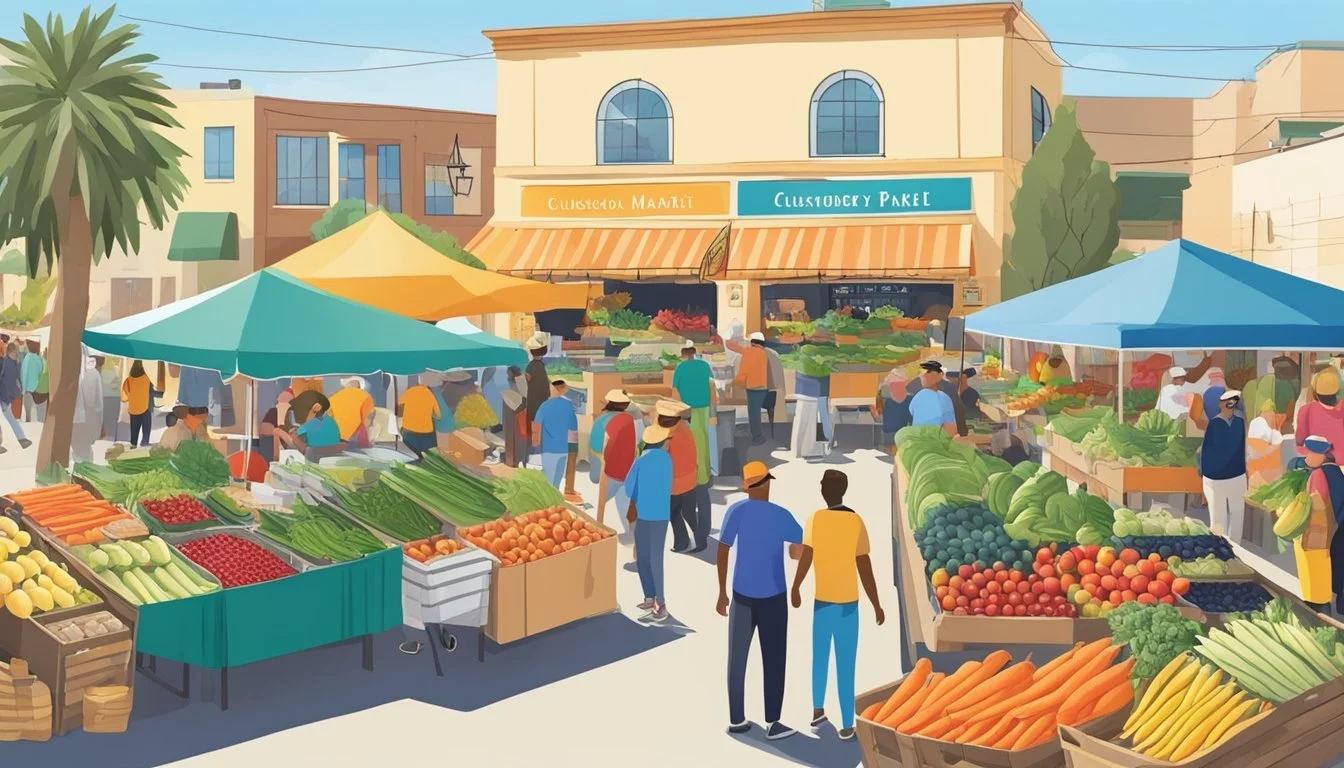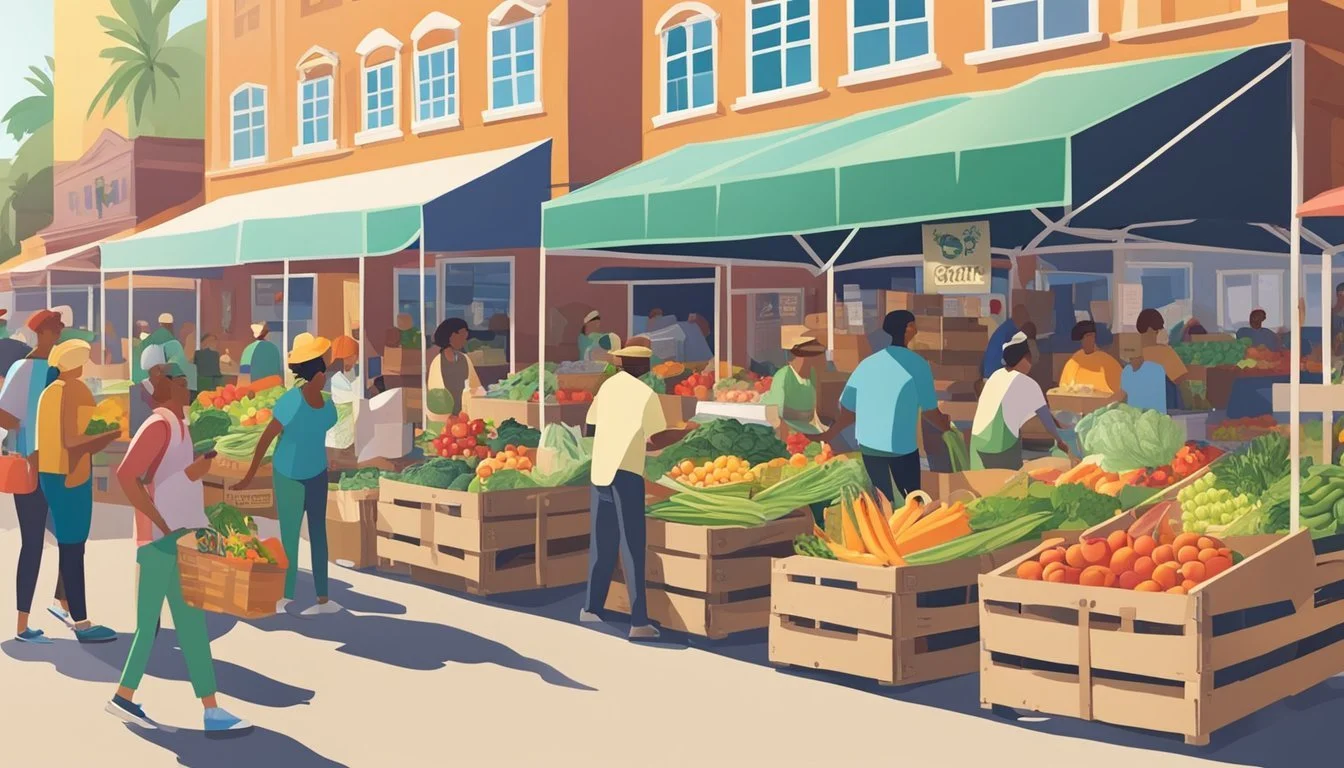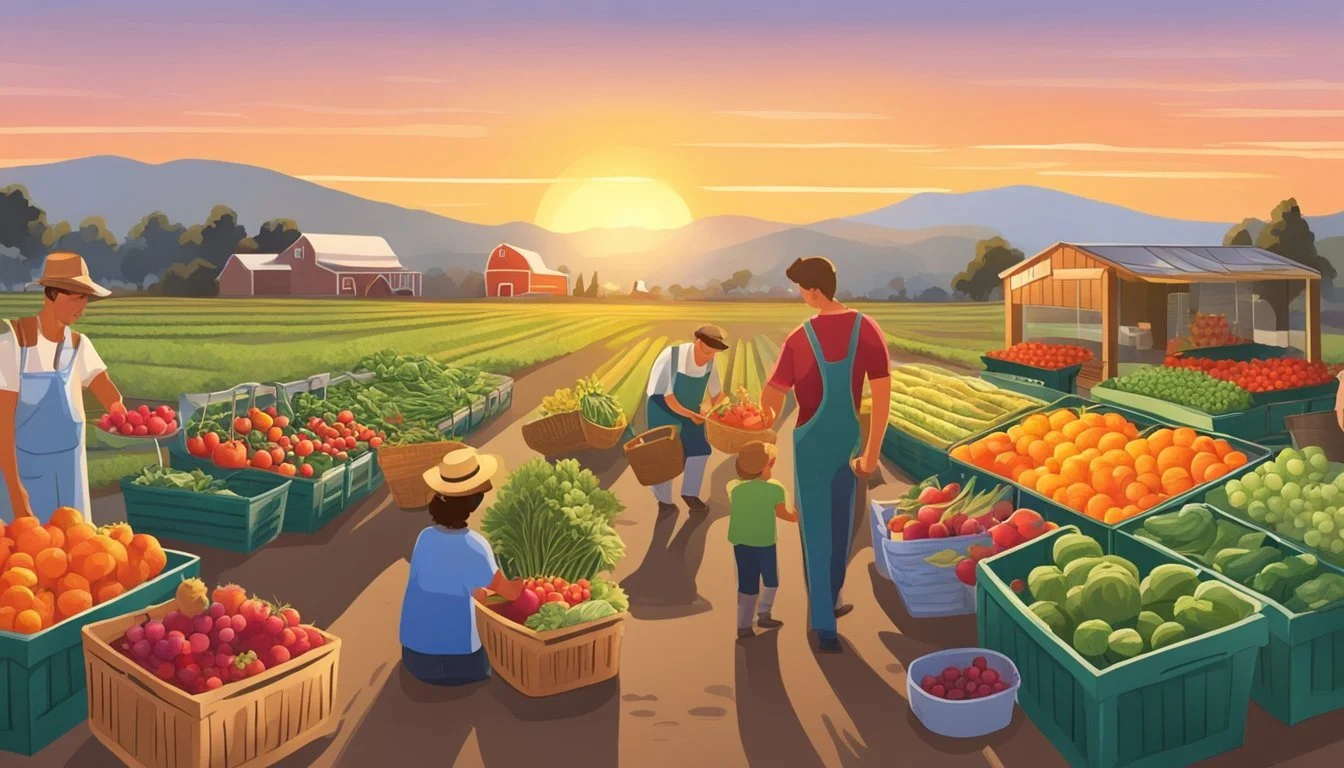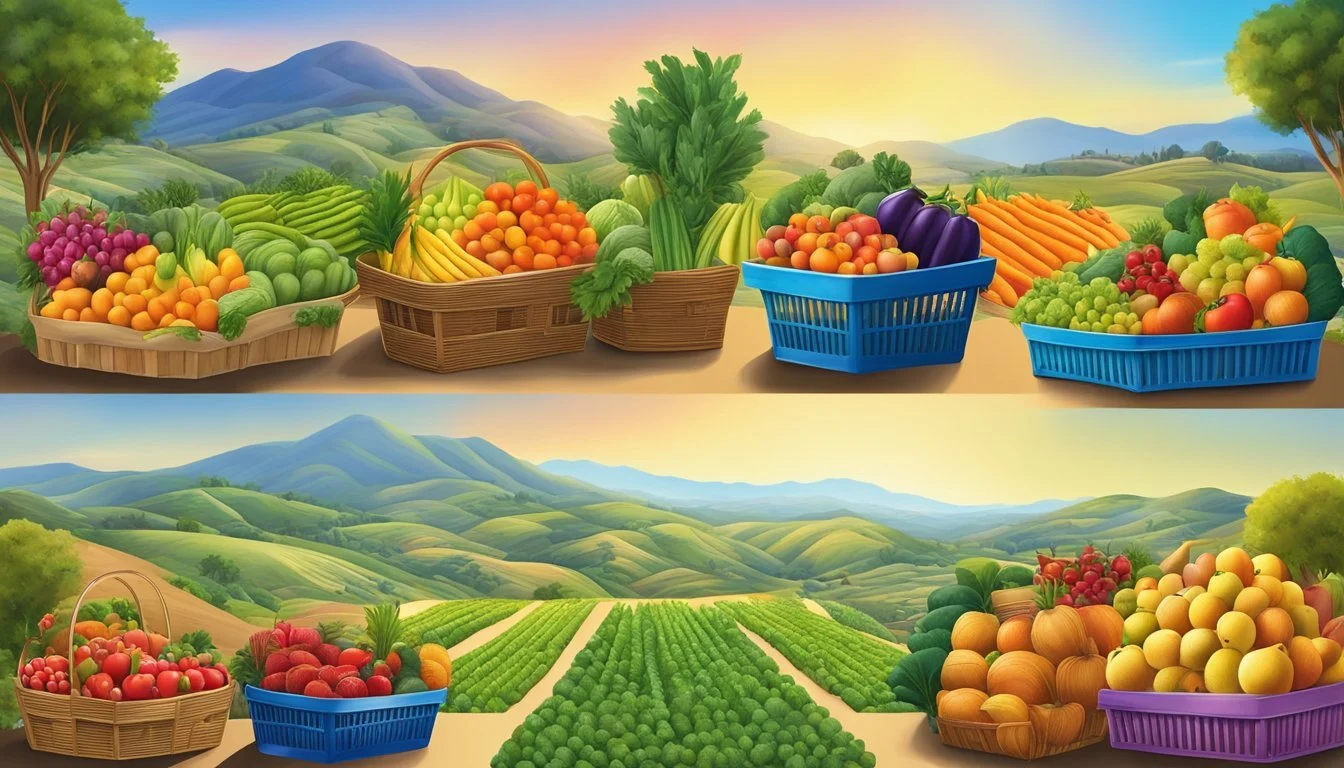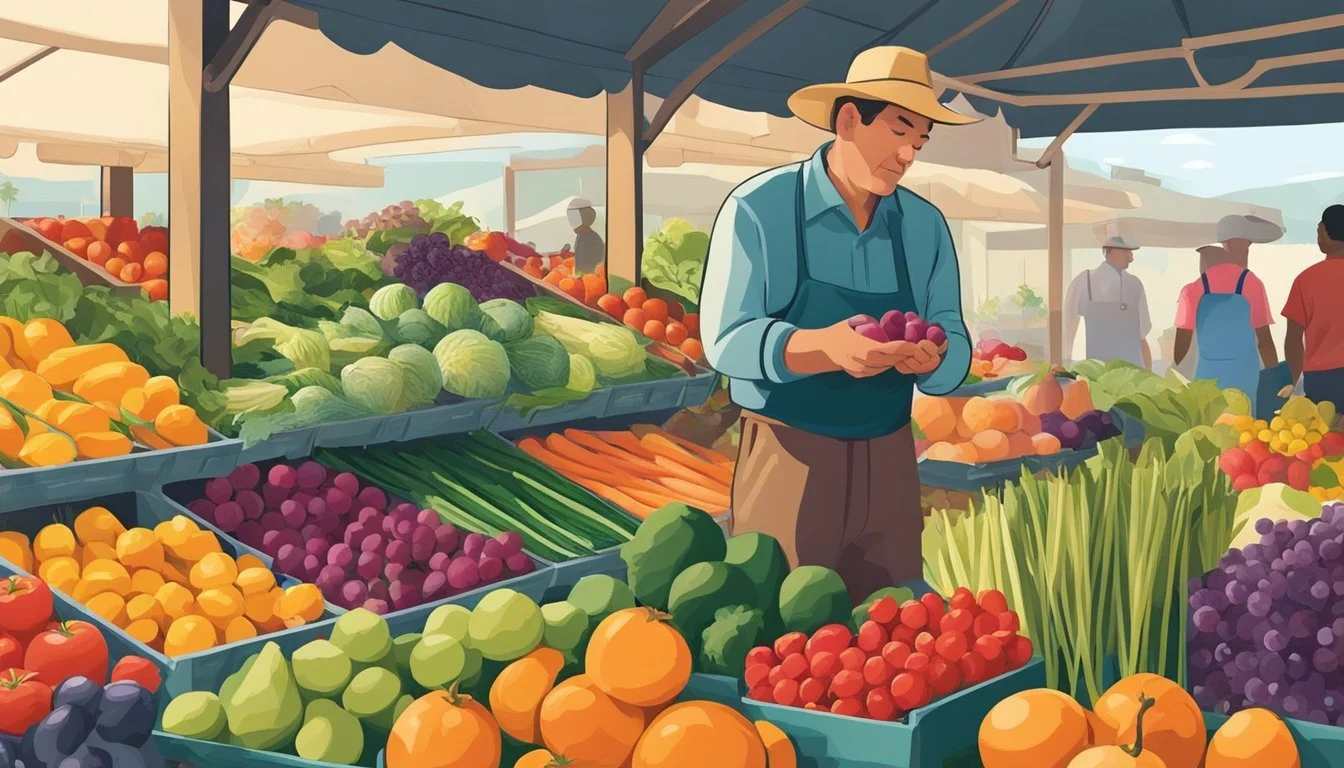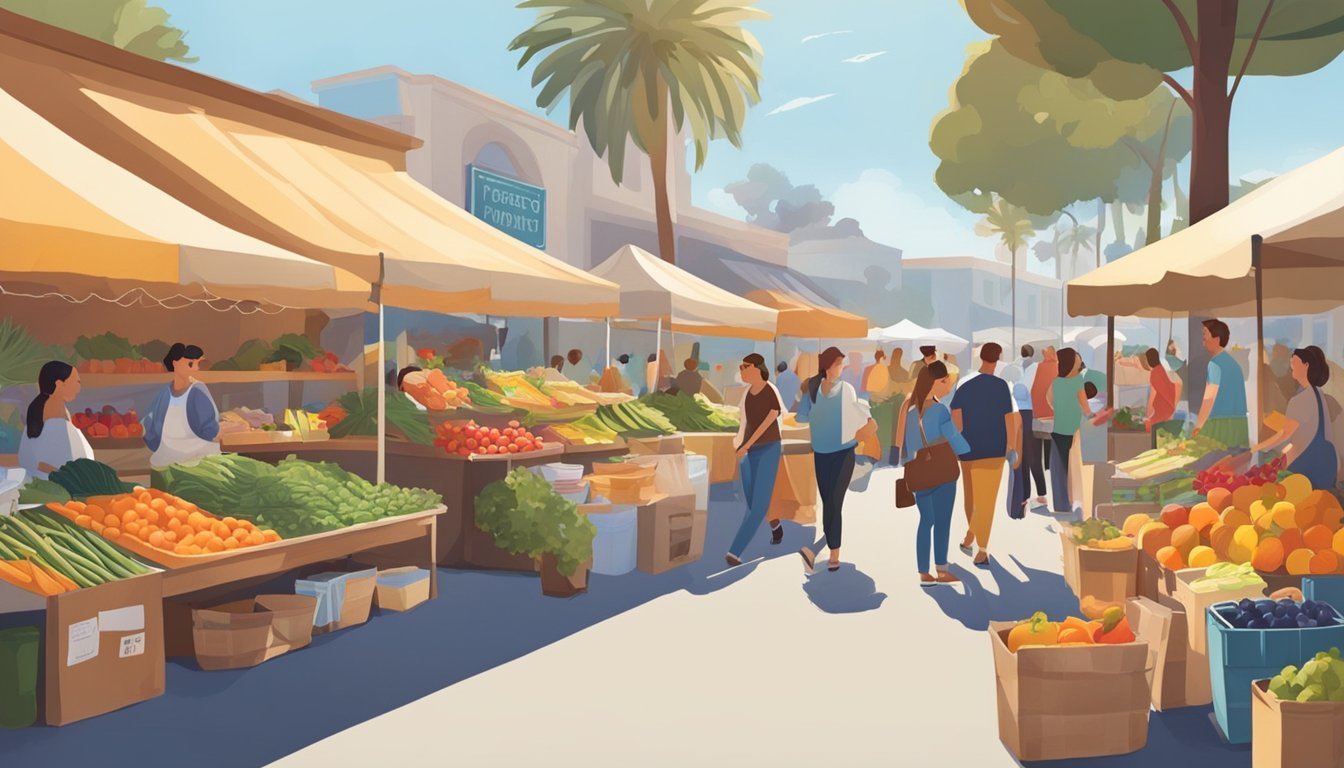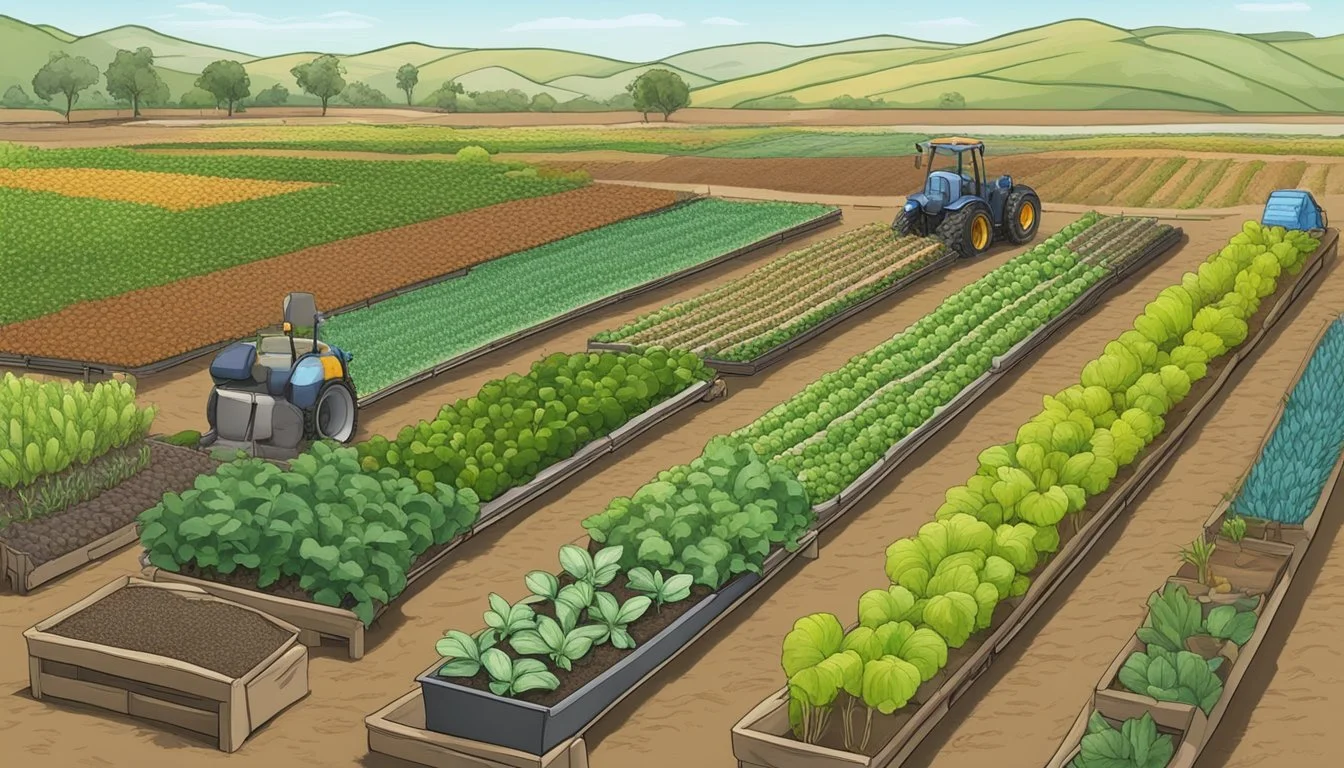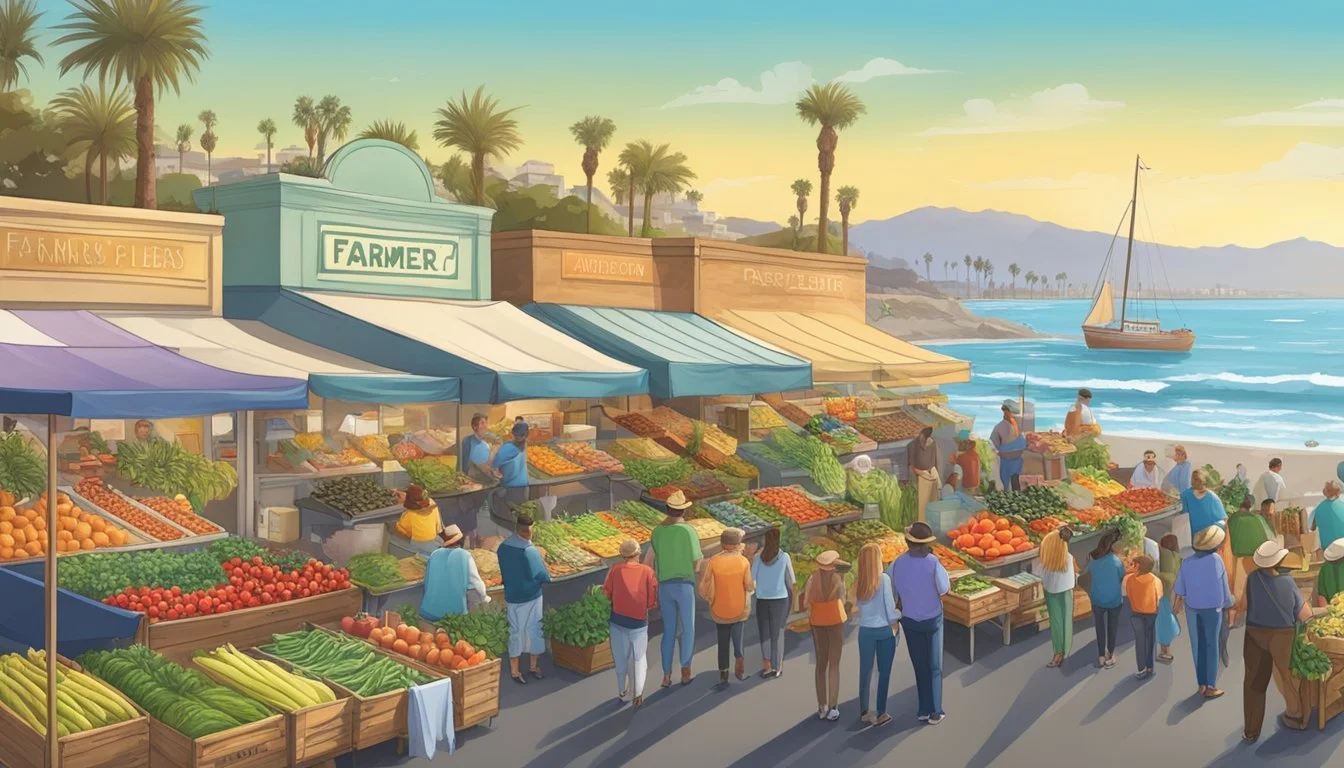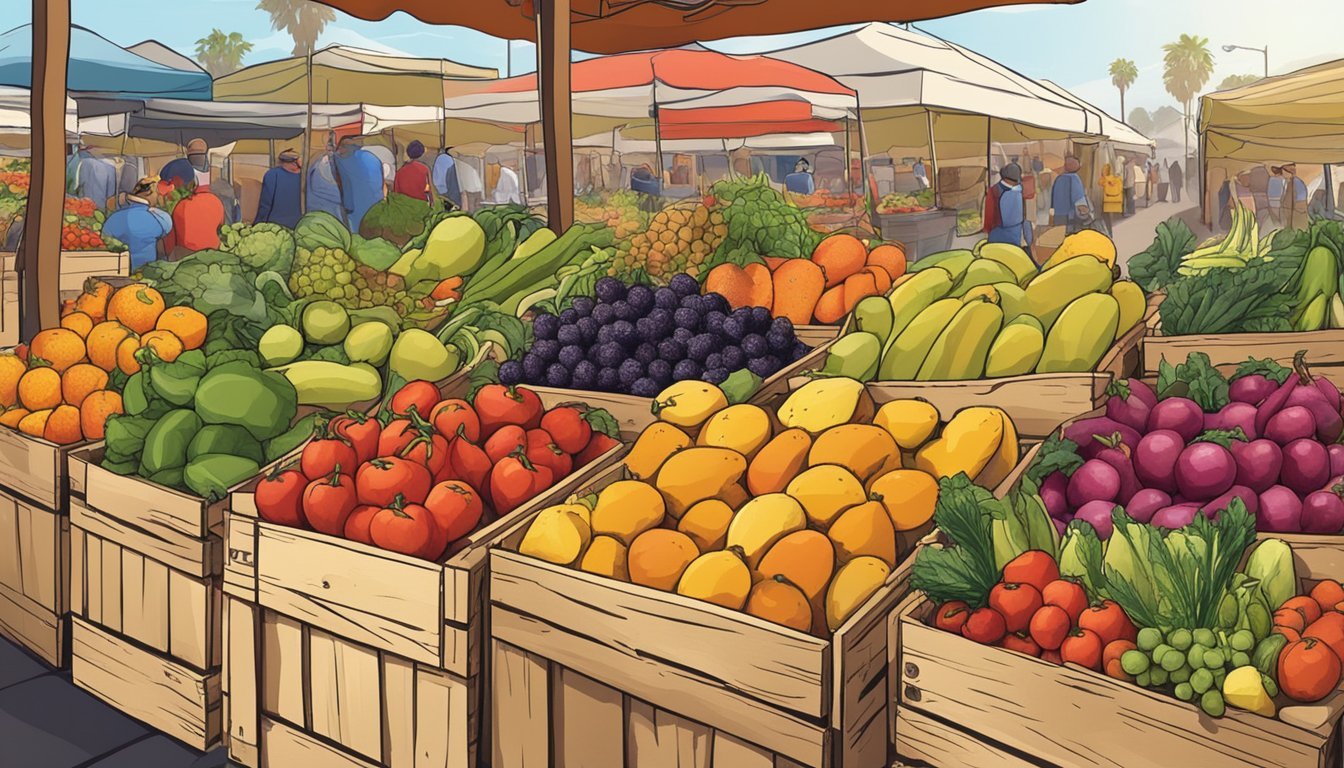Community Supported Agriculture (CSA) in Oceanside, CA
A Sustainable Choice for Locals
Community Supported Agriculture (CSA) is an innovative model that connects local farmers directly with consumers in Oceanside, California. It's a symbiotic system where residents support their local agricultural community by purchasing shares of a farm's harvest in advance. This pre-payment model allows farmers to receive funds when they need them most — during the planting and growing seasons. In return, consumers receive fresh, often organic produce, fostering a communal bond with the land and people who cultivate their food.
In Oceanside, several farms operate CSA programs, offering an array of freshly picked fruits and vegetables to their members. Originating as a niche market for organically grown produce, the CSA model in this region has blossomed, becoming a popular means for individuals and families to receive nutritious and seasonally fresh produce right from their backyard, so to speak. Farms like JR Organics and Yasukochi Family Farms have been pivotal in supporting and sustaining the CSA movement in the area, emphasizing the significance of organic farming practices and the value of community involvement in local food systems.
The CSA model not only supports local farmers financially but also promotes environmental stewardship and healthier eating habits among consumers. It encourages a direct relationship with the process of food production, providing transparency and education on sustainable farming practices. For the residents of Oceanside, this means that participating in a CSA is more than just a way to shop; it's an investment in the community's health, economy, and the environment.
What Is Community Supported Agriculture (CSA)?
Community Supported Agriculture (CSA) embodies a partnership between local farmers and community members, fostering a direct link to fresh, organic, and nutritious produce.
History of CSA
The concept of CSA started in the early 1960s in Germany, Switzerland, and Japan as a response to concerns about food safety and the urbanization of agricultural land. It arrived in the United States in the 1980s and has seen a steady increase in popularity. CSA is based on the principle of mutual benefit between the local farmer and community members.
CSA Principles
The core principle of CSA revolves around shared risk and reward: community members pre-purchase shares of the harvest, providing farmers with the capital needed at the start of the growing season. In turn, members receive a regular supply of fresh produce harvested at its peak. This model promotes environmental stewardship, sustainable farming practices, and a closer consumer-farmer relationship.
Benefits of Joining a CSA
Joining a CSA provides numerous advantages, including:
Access to fresh, organic produce: Members enjoy seasonal goods directly from the farm.
Health and Nutrition: The availability of fresh food promotes a healthy and nutritious diet.
Support for Local Farmers: The upfront investment aids financial stability for farmers.
Community Engagement: It fosters a sense of community through shared commitments to local agriculture.
CSA Programs in Oceanside
Oceanside, California, is home to various CSA programs offering fresh, locally-sourced produce to the community. These programs connect consumers directly to their food source, fostering a relationship between local farms and residents.
Yasukochi Family Farm
The Yasukochi Family Farm provides a wide array of produce through its CSA program, emphasizing health and community support. Members receive a weekly box of freshly picked fruits and vegetables, exposing them to the diversity and seasonality of California's San Diego region produce.
Rodney Kawano Farms
Rodney Kawano Farms is a third-generation local farm offering fresh vegetables and fruits in Oceanside and Vista, California. Their CSA boxes feature produce grown with a focus on sustainable farming practices and a commitment to quality.
Abundant Harvest Organics
Abundant Harvest Organics operates as part of Oceanside's CSA landscape, but specific details about this farm were not provided in the search results. Typically, such CSA programs would offer organic produce sourced from California farms, distributed weekly to members in the San Diego area, and Oceanside, in particular, supporting local agriculture and providing community access to nutritious food.
The aforementioned CSA programs showcase Oceanside’s contribution to sustainable agriculture, with each farm offering unique benefits to its members.
How CSAs Work
Community Supported Agriculture (CSA) in Oceanside, California, operates on a subscription basis where members receive regular distributions of fresh, often organic produce directly from local farms.
Membership
Members of a CSA in Oceanside, CA commit to supporting a local farm for an entire growing season by purchasing a share. A share typically equates to a portion of the anticipated harvest. By doing so, they become stakeholders in the farm's yield and share in the risks and benefits of food production.
The CSA Box
The CSA box is the tangible output of a member's share, usually composed of a variety of fresh, seasonal produce. The contents of the box are determined by what the farm harvests that week, ensuring that members receive the peak flavors of ripened produce. Some farms offer customizations, allowing members to select preferences based on the farm's current offerings.
Pick-up and Delivery Options
Members can typically choose between pick-up or delivery for receiving their CSA box. Pick-up often takes place at designated local farmers' markets or on the farm itself, fostering a connection between consumers and growers. Delivery options may be available for convenience, with the frequency of distribution generally being weekly or in some cases, bi-weekly.
Benefits of Local Produce
Local produce in Oceanside, CA, demonstrates a blend of environmental sustainability and economic vitality. It underscores a commitment to both ecological health and community prosperity.
Environmental Impact
Local farmers in Oceanside engage in sustainable farming practices, which have a positive environmental impact. They tend to use less packaging and shorter transport routes, reducing carbon emissions and waste. For instance, JR Organics, a farm in Escondido, opts for eco-friendly materials and natural fertilizers like kelp and compost. This focus on sustainability underscores the broader, ongoing effort to maintain a healthy ecosystem through responsible agriculture.
Reduction in transportation: Locally-grown produce travels a shorter distance to reach consumers, which cuts down on fuel consumption and air pollution.
Sustainable practices: Farms like Yasukochi Family Farms employ crop rotation and organic techniques, limiting the need for chemical pesticides and fertilizers, which in turn conserves soil and water quality.
Economic Benefits
The local economy reaps significant benefits from the presence of Community Supported Agriculture programs and local farmers markets. By purchasing from a CSA, consumers directly support local farmers and businesses, keeping money within the community. This direct support helps to maintain the economic viability of farming as a local business.
Support for local businesses: CSAs encourage community members to buy from nearby farms, like those in Oceanside, bolstering the revenue of these operations.
Creation of local jobs: The operation of CSAs and local farmers markets generates employment opportunities, ranging from agricultural work to market sales positions.
These aspects of local produce consumption—environmental and economic—compose a compelling argument for supporting local farming endeavors and enjoying the benefits of fresh, organic goods.
Seasonal Offerings in Southern California
Southern California's CSA programs offer a diverse range of fresh produce that varies by season, ensuring that members receive the best of what is currently available for harvest.
Spring Selections
In the spring, strawberries begin to ripen and are commonly found in CSA boxes alongside a variety of leafy greens. Spring is also a prime time for broccoli and carrots, which thrive in the cooler temperatures of the season.
Strawberries: Juicy and sweet
Broccoli: Rich in nutrients and versatile for cooking
Carrots: Crunchy and commonly enjoyed both raw and cooked
Summer Harvest
Summer amplifies the bounty with a colorful assortment of fruits and vegetables. Tomatoes, cucumbers, and a variety of stone fruits reach their peak, offering a fresh taste of the season's warmth.
Tomatoes: Ripe and flavorful, perfect for salads and sandwiches
Cucumbers: Crisp and refreshing
Stone Fruits (e.g. peaches, nectarines): Juicy and full of summer flavor
Fall Varieties
As the heat subsides, the harvest transitions into fall with root vegetables and squash taking center stage. CSA participants can expect to see potatoes and a continuation of tomatoes from the summer surplus.
Potatoes: Hardy and a staple for many dishes
Tomatoes: Late bloomers may still be harvested
Squash: Comes in many varieties, from acorn to butternut
Winter Crops
Winter brings about hardier crops that can withstand cooler temperatures. Citrus fruits, such as oranges and lemons, are common, providing a burst of fresh flavors during the colder months.
Citrus Fruits: Includes a delightful assortment of oranges, lemons, and tangelos
Leafy Greens: Kale and spinach are often available throughout the winter
Preparing CSA Produce
Community Supported Agriculture (CSA) boxes from Oceanside, CA, are teeming with a variety of fresh, organic produce. To maximize the nutritional benefits and flavors, knowing how to store and cook these items is key.
Storage Tips
Proper storage of fresh produce is essential to maintain freshness and nutrition. Here are some specific tips for CSA members:
Leafy Greens: Place in a plastic bag with a paper towel to absorb excess moisture and store in the crisper drawer.
Root Vegetables: Store items like carrots and beets in a cool, dark place or in the refrigerator crisper.
For most vegetables:
Avoid washing until ready to use to prevent spoilage.
Store tomatoes at room temperature away from sunlight to maintain flavor and texture.
Cooking Ideas
CSA produce offers endless cooking possibilities. Here's how to create nutritious meals:
Salads: Utilize crisp greens and raw vegetables for a refreshing salad. Add a simple dressing of olive oil, lemon juice, salt, and pepper to enhance their natural flavors.
Roasting: Vegetables like broccoli, carrots, and squash develop rich flavors when roasted. Toss with olive oil and your choice of herbs before roasting at 400°F for 20-25 minutes.
Remember to incorporate a variety of vegetables in recipes to benefit from the range of nutrients they offer.
Choosing the Right CSA
When selecting a Community Supported Agriculture (CSA) in Oceanside, CA, one must consider the diversity of produce offered, the sustainability practices of local farmers, and the flexibility of CSA programs.
Questions to Ask Farmers
Prospective CSA members should inquire about farming practices and the variety of produce they can expect. Essential questions to ask include:
What are your farming practices, and are you certified organic?
Can you provide examples of what a regular box versus a jumbo box contains?
How do you handle crop failures or excess?
Is there a trial period for new CSA members?
Types of CSA Boxes
CSAs often offer a range of CSA boxes to fit different household sizes and needs. It is important to understand:
Regular Box: Typically contains an assortment of 11-15 fresh produce items, suitable for small families or individuals.
Jumbo Box: Larger in size, designed for households that consume more produce or for those who like to entertain.
Members should choose a box type that aligns with their consumption patterns to reduce food waste and manage costs effectively.
Commitment and Flexibility
The level of commitment and flexibility in a CSA membership can vary. Members should consider:
The length of the CSA membership season and any options for pausing or canceling the subscription.
Pickup and delivery options, and whether these align with personal schedules.
The willingness to try new vegetables and fruits, as the contents of CSA boxes are often based on seasonal availability and may introduce unfamiliar produce.
By critically evaluating these aspects, individuals can choose a CSA that supports healthy eating habits and contributes to the local agricultural community sustainably.
Joining the Local Food Movement
Engaging with Community Supported Agriculture (CSA) in Oceanside, California, offers residents a meaningful way to participate in the local food movement. By becoming CSA members, individuals directly support Southern California farms, gain access to fresh, seasonal produce, and contribute to community-building initiatives.
Supporting Southern California Farms
Community Supported Agriculture in Oceanside connects consumers to local farmers, ensuring that the fruits and vegetables they eat are grown close to home. CSA members buy shares from local producers, such as JR Organics in Escondido, and receive regular deliveries of farm-fresh goods. This model sustains farms in the San Diego area by providing them with a reliable income stream and reducing the financial uncertainties of farming.
Farms Supported through CSA in Oceanside Area:
JR Organics, Escondido
Yasukochi Family Farms
Other farms listed on LocalHarvest
Consumers benefit from a deeper understanding of their food sources and become part of a movement that values environmental stewardship and economic support of local growers.
Community Events and Workshops
In addition to the tangible benefits of fresh produce, CSA programs often include events and educational workshops that strengthen the community. These initiatives provide opportunities for CSA members to learn about sustainable agriculture practices, seasonal food preparation, and the benefits of eating locally.
Sample Events and Workshops:
Farming Techniques Education
Meet-and-Greets with Local Farmers
The education offered through these events fosters a well-informed community that is equipped to make healthy food choices and support the longevity of local farming. By actively participating in these workshops, CSA members in the Oceanside area contribute to a resilient food system within Southern California.
Sustainable Farming Practices
In Oceanside, California, CSA programs are known for their commitment to sustainable farming practices, ensuring that the local community has access to fresh, certified organic produce. Emphasis is placed on responsible agricultural methods that not only yield high-quality crops but also safeguard the environment.
Organic Certification
CSAs in Oceanside prioritize organic certification, indicating their adherence to stringent agricultural standards. JR Organics, a notable local CSA provider, maintains certification and is recognized for its dedication to organic farming since 1986. This small family farm, like others, must comply with regulatory requirements, which prohibit synthetic pesticides and fertilizers, and mandate crop rotation and other natural practices to maintain soil health and ecosystem balance.
Fertilizers and Composting
A vital aspect of these sustainable practices is the use of natural fertilizers and composting methods. Fertilizers are chosen with care to enhance soil fertility without harmful chemicals. Examples of such fertilizers include:
Rock phosphate
Green sand
Worm castings
Kelp
Compost is a fundamental component in sustainable farming, as it recycles organic matter, enriching the soil with nutrients. By creating a closed-loop system, small farms not only fortify their crops but also contribute to a reduction in agricultural waste. Local farmers employ composting to transform natural waste into valuable organic matter, supporting their crops and reducing the need for synthetic alternatives.
Expanding the CSA Model
The Community Supported Agriculture (CSA) model in Oceanside, California is evolving, as initiatives push past traditional boundaries to embrace a more inclusive and diverse range of products and partnerships.
CSAs Beyond Produce
Community Supported Agriculture (CSA) in Oceanside is no longer confined to just fruits and vegetables. CSAs are now offering a variety of other farm products. For instance:
Flowers: CSA members can receive fresh, locally-grown flowers alongside their regular produce boxes.
Herbs: Culinary and medicinal herbs are being included to meet the growing demand for holistic wellness products.
Eggs: Fresh eggs from pasture-raised chickens provide a protein-rich addition to CSA shares.
Honey: Local beekeepers partner with CSAs to supply raw, unprocessed honey, showcasing the sweeter side of agriculture.
This diversification enhances the value for members and supports local agriculture in a more holistic manner, ensuring Superior Organic Produce and other family farms can cater to the various needs of Over 60 Communities in the region.
Community Alliances and Partnerships
Community Supported Agriculture is strengthening its roots in Oceanside through strategic alliances and partnerships. These collaborations include:
California Organic Family Farmers: By aligning with groups of organic producers, CSAs ensure a steady supply of certified organic produce to their members.
Community Alliances: CSAs in Oceanside are forming alliances with schools, hospitals, and local businesses to expand their reach and impact.
Partnerships with Artisans: By including products such as speciality breads, jams, and cheeses from local artisans, CSAs are driving a comprehensive approach to community-supported commerce.
These partnerships not only expand the market for CSA products but also bolster the local economy and foster a sense of community amongst different stakeholders.
Frequently Asked Questions
In navigating the world of Community Supported Agriculture (CSA) in Oceanside, CA, potential members often have questions about managing their expectations, handling the abundance of produce, and creating meaningful connections with local farmers. The subsections below address these inquiries with practical tips and insights.
Managing Expectations
When individuals become CSA members, they should understand that they're purchasing shares of a farm's harvest. Expectations should be set that the variety and quantity of produce will vary depending on the season and farm production capacity. Members may experience fluctuations in their weekly bounty—some weeks might be more bountiful than others, with a variety of produce types, while some might offer less variety.
Handling Surplus Produce
One common question is what to do with surplus produce. CSA members can consider the following tips:
Preservation: Members can preserve excess fruits and vegetables through freezing, canning, or pickling.
Sharing: A surplus can be shared with neighbors, friends, or donated to local food banks, maximizing the health benefits within the community.
Recipe Exploration: Use the opportunity to try new recipes that utilize a larger quantity of produce.
Creating a Relationship with Your Farmer
Creating a relationship with farmers is a valued aspect of the CSA model. Members are encouraged to:
Visit the Farm: If the CSA program allows, visiting the farm can enrich the member's understanding of how their food is grown.
Communication: Open communication with farmers can foster a stronger community bond and sometimes influence the types of produce grown, tailoring to member preferences when possible.
Feedback: Constructive feedback is often welcome, as it helps farmers gauge member satisfaction and improve the CSA experience.
By considering these points, individuals can enhance their CSA experience in Oceanside and support local agriculture in a meaningful way.
Oceanside CSA Directory
Community Supported Agriculture (CSA) programs in Oceanside connect consumers directly with local farms, ensuring access to fresh produce while bolstering community farming endeavors. This directory provides detailed listings and essential contact information to connect residents with their nearby CSA providers.
Local CSA Listings
Located in Oceanside, California, known for its robust CSA program.
Offers a variety of fresh produce in their CSA boxes.
J.R. Organics
Long-standing provider of certified organic produce since 1986.
Available at various farmers markets and offers different CSA membership options.
Other notable CSA programs in the North County region include:
Garden of Eden: offers a traditional CSA program.
LocalHarvest listings: Provides an extensive directory of CSA options, covering areas like Vista, Carlsbad, Fallbrook, Encinitas, and beyond.
Contact Information and Schedules
Yasukochi Family Farms
Website: Yasukochi Family Farms
CSA Schedule: Rotating weekly boxes; sign up via their website.
J.R. Organics
Email: contact@jrorganics.com
Phone: 760-638-6387
Farmers Market Locations: Escondido, Oceanside Morning Farmers Market, Pacific Beach Farmers Market, Solana Beach Farmers Market
CSA Schedule: Membership details and schedules can be found on their website.
For residents in neighboring communities such as San Marcos, Solana Beach, Poway, and La Jolla, these CSA programs offer various pick-up locations or delivery options to bring farm-fresh produce closer to home. Ensure to visit each farm's website or contact through provided details for the most up-to-date information on CSA offerings and how to participate.
Conclusion
Community Supported Agriculture (CSA) in Oceanside represents a sustainable model for food production and consumption. By connecting local producers and consumers directly, CSAs ensure that residents have access to fresh, regionally grown produce. The impact of such networks extends beyond the immediate economic benefits to farmers; they foster community engagement and support environmental stewardship.
Key Advantages:
Freshness: Produce is typically harvested closer to delivery time.
Supporting Local Economy: Financial resources stay within the community.
Environmental Benefits: Reduced transportation distances lower the carbon footprint.
The success of CSAs in Oceanside hinges on a strong, cooperative community. Members not only enjoy seasonal fruits and vegetables but also contribute to the resilience and sustainability of their local food systems. Challenges exist, such as competition and the need for ongoing community-building efforts, but the positives have been evident.
Local Oceanside farms delivering through CSAs have seen steady growth, indicating a receptive community that values the freshness and quality of local produce. The model may not replace conventional food systems entirely, but it certainly offers an enriching alternative that resonates with the values of health, sustainability, and community.

